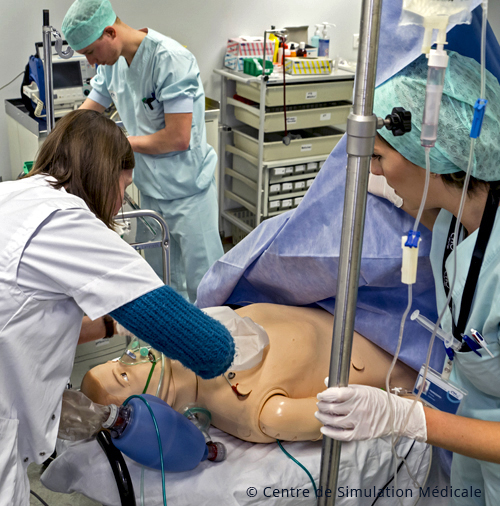Training platform
Description
The online platform is before all a digital tool accessible to project partners.
- They will be able to upload and work on different simulation activities based on non-technical skills (including CRM concepts).
- The platform will centralise information for all European academic institutions in healthcare.
It will be divided in activities sorted in relation to learning, from the theoretical framework to evaluation tools and practice impact.
Thanks to this platform, a partnership between several academic institutions will be developed in the framework of the project: they will work on team management principles through the acquisition of non-technical skills focussed on crisis resource management (CRM) and human factors, which will be then transfered to real-life situations. This learning dynamic will also apply in debriefings, common reflection phases between people of different disciplines.
Therefore, this platform will be complementary to that of the first SimuCarePro project, which centralises different tools validated by the training and professional area, in which evidenced-based clinical judgement had been developed and tested by the partnership.
CRM training for instructors on the platform
The platform will let simulation instructors from other institutions autonomously acquire concepts of competences in team management (CRM and human factors) written by external CRM experts.
Objective of this step: to command several notions and a common lexicon in the medical and paramedical training area, which will be gradually transfer to the professional area.
The partners will learn theoretical concepts based on relevant bibliographical references that meet European requirements in healthcare and those of education related to communication and team management. The theoretical concepts can be divided in 4 catégories (M. Jaffrelot, S. Boet, A. Di Cioccio, E. Michinov and G. Chiniara (2013)):
- Leadership and group synergy
- Communication
- Situation awareness
- Resource management, planning and anticipation
Platform structure
- CRM online learning: material/exercises provided by the partners. Later, different types of activities (self-corrected exercises, videos, final evaluation)
- Scenario database focussed on non-technical skills (creation and implementation)
- CRM debriefing: analysis of the processes and of efficiency under the form of recommendations to design/conduct a debriefing adapted toCRM concepts integration
- Online evaluation grid
A platform supplied by the partners
The partners will feed the platform concrete examples from real-life topics, in which each CRM principle will be the object of an activity that is specific to the principle and to learning. These activities will involve reflection skills and theoretical knowledge to prepare the implementation in simulation that will require to use middle and high-fidelity dummies.
Two types of scenarios will be worked
- Validated scenarios from the SimuCarePro project
- New scenarios
Starting from real-life topics provided by medical learners and supported by bibliographical researches based on Evidence Based Nursing and Medical guidelines, educational objectives will be simultaneously oriented towards technical and non-technical aspects. Simulation instructors will be responsible for writing scenarios, based on the methodology designed and validated by SimuCarePro.
To validate the acquisition of non-technical skills, learning evaluation tools will be selected and validated by the consortium. The relevance of learning in multidisciplinary and interprofessional team will also be questioned by selected tools and tools written based on criteria previously defined by the European partners.
Scenario implementation in multidisciplinary teams
The scenario implementation will be multidisciplinary and interprofessional, associating medical and paramedical learners. This will make training appropriate to the development of competences related to crisis management without risk for the patient. This practice will foster the development of a better knowledge of team members' prerogatives, responsibilies and roles.
Debriefings and recommendations
Most important step of the implementation. It puts the simulation experience in perspective, and makes knowledge transfer to clinical practice easier. Paramedical and medical learners' common reflection will provide a global analysis of the situation and knowledge integration will thus happen at several levels. The debriefing session may include videos, while team or peer debriefing and self-debriefing will follow the European partners' exploitation modalities. At the end of the project, the partners will formalise the analysis results and the evaluation of this debriefing step as recommendations.
|
Summary: Results available on the platform
|


